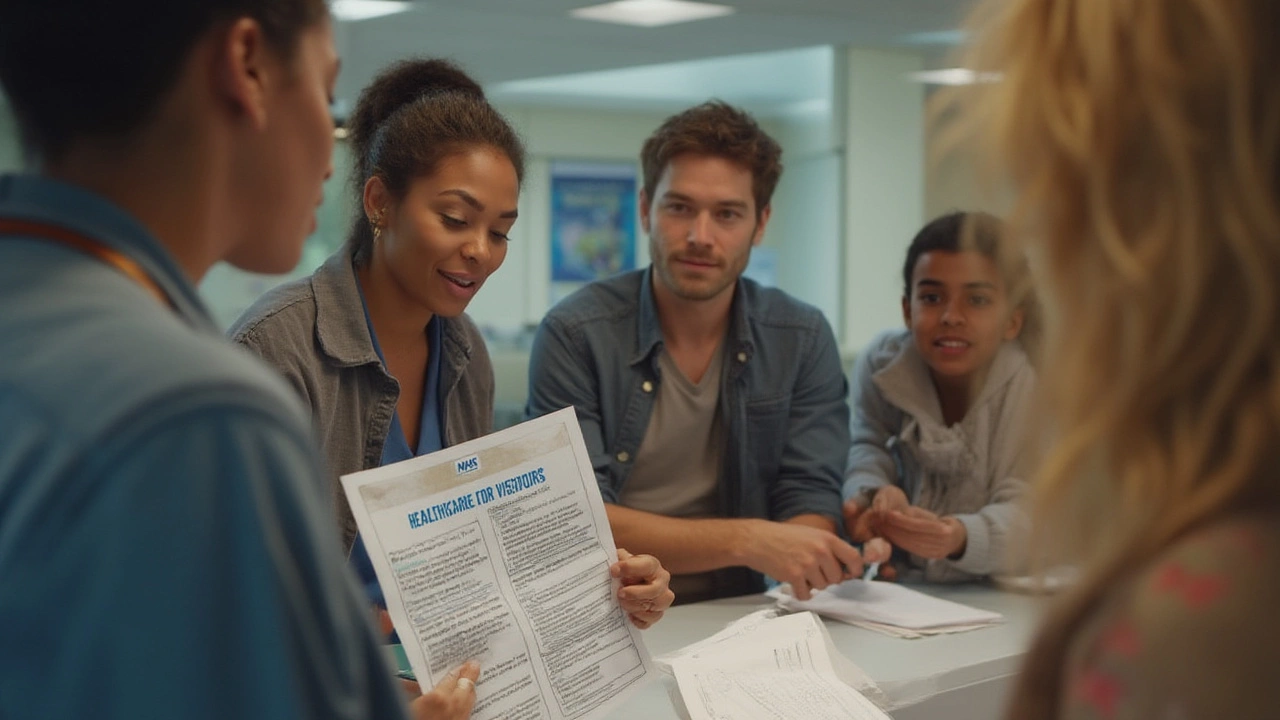 Jul, 29 2025
Jul, 29 2025
Ever heard wild stories about backpackers landing in London with the flu and getting whisked into a gleaming NHS hospital for completely free treatment? Or the old tale about tourists milking the system for expensive surgeries? There’s a lot of noise—and not all of it rings true. What’s the real scoop? Who actually gets NHS healthcare in the UK without having to hand over their credit card? And if you’re thinking of heading to the UK—maybe as a tourist, a student, or even after a wild move for love—what should you really expect if you need medical help?
How the NHS Works: Who Actually Pays for Healthcare?
Britain’s National Health Service is legendary. Started in 1948, the idea was simple: healthcare should be free at the point of use, funded mainly by tax. Today, the NHS treats over a million people every 36 hours. That’s a mind-boggling number—almost the population of Birmingham, showing just how many rely on it. But here’s what many don’t realize: the NHS wasn’t built with the globe-trotting tourist in mind. It’s first and foremost for people “ordinarily resident” in the UK. That’s government speak for someone who lives here and plans to stick around. For these residents, doctor visits, emergency treatment, and even complex surgeries are usually free—well, not free, strictly speaking, because they’re paid for via taxes and National Insurance contributions. If you live here, part of your paycheck helps fund the NHS, so you get to use it.
But this all changes when we talk about visitors and newcomers. Foreigners fall into a tangled web of rules, and where you stand depends on whether you’re a holidaymaker here for two weeks, a student, or a new expat. NHS care isn’t designed as a free-for-all. The UK government watched the NHS bill for "health tourism" climb to an estimated £300 million a year—not peanuts when the system already struggles with tight budgets, long waiting lists, and staff shortages. So, in the last decade, rules were toughened: hospitals are legally required to check whether patients are eligible for free NHS care. That wasn’t always the case—years ago hardly anyone got asked for proof at the ER door.
But let’s bust two big myths: First, not every foreigner gets hit with surprise bills. Second, serious emergencies—think life-or-death situations—are never held up by payment demands (more on that in a bit). Whether you pay or not can hinge on your visa, your time in the UK, or even the specific treatment you need.
NHS Treatment for Foreigners: What’s Free—and What’s Not
This is where it gets interesting. If you’re a tourist, student, on a work visa, or visiting family, the way you access the NHS free healthcare is anything but simple. The golden rule is: being in the UK doesn’t automatically mean you get healthcare for nothing. Let’s break it down.
- Emergency Care: If you collapse at Big Ben or crash a bike in the Cotswolds, the NHS won’t check your passport before treating you in an emergency room. Immediate, urgent care is always free—this covers Casualty or A&E admissions and care needed to stabilize you.
- GP Visits: Many people are surprised that seeing a General Practitioner (GP) might not always be free to everyone. In practice, many GPs let foreigners register temporarily, so tourists often get away with a consultation without being charged—but it’s not a legal right. Some surgeries ask for proof of address; some don’t. It’s luck of the draw and how willing your local practice is.
- Prescriptions: These are not usually free for anyone, except for certain groups (children, elderly, maternity) and people in specific situations. Most adults pay a flat fee—currently £9.65 per prescription in England as of early 2025. In Wales, Scotland, and Northern Ireland, prescriptions are actually still free for everyone. I told Jasper, "You’d better love living in England—no free antibiotics here!"
- Routine and Planned Care: Here’s the wall. If you need an MRI, elective surgery, or even specialist treatment, tourists usually have to pay the full cost upfront—often several times higher than what the NHS charges its own because foreign patients don’t get the government discount. Hospitals must check your residency status and send bills to anyone not eligible.
Then there are clever little exceptions and treaties that trip people up. For example, EU and EEA visitors (plus Switzerland) used to be able to flash their European Health Insurance Card (EHIC) for treatment. Since Brexit, that’s mostly been replaced by the UK’s Global Health Insurance Card (GHIC) and some reciprocal agreements, but coverage isn’t as generous—it mostly covers emergency and unavoidable care, never planned treatment or private hospitals.
What about students or workers? If you get a visa for over six months, like for university, you pay the NHS ‘immigration health surcharge’ (IHS) upfront as part of your visa fees. As of 2025, that's a pretty chunky £776 per year for adults and £588 for kids. Pay this, and you’re in: you'll access the NHS like a UK resident, including GP visits and hospital care. Miss it—forget about treatment unless you shell out per appointment.
The table below shows at-a-glance what you can expect in terms of payment for typical scenarios:
| Situation | Free? | Notes |
|---|---|---|
| Emergency room (A&E) visit | Yes | Provided treatment is urgent |
| Ambulance call-out | No | Usually billed to tourists unless a UK resident |
| GP appointment | Sometimes | Dependent on local rules/registration |
| Specialist treatment, surgery | No | Tourists must pay, visa holders may be covered |
| Prescriptions (England) | No | Flat fee applies |
| Prescriptions (Wales/Scotland/NI) | Yes | Free for all |
Reciprocal agreements pop up here and there. Australia and New Zealand, for instance, have limited agreements covering urgent care for temporary stays, but don’t bank on getting full NHS access unless you’ve jumped those visa hurdles.

What Happens If You Need Treatment: Paperwork, Bills, and Avoiding Surprises
If you do land in a hospital with a broken ankle while exploring the Lake District or suddenly need antibiotics after a sniffle in Sheffield, you’ll likely meet a friendly coordinator after the doctors do their thing. Hospitals increasingly check eligibility by asking for proof—passport, visa, or proof of residency. They’ve got to—it’s the law. If you’re not a resident, you’ll leave with a bill you’re expected to pay, often before treatment starts (unless it’s an emergency). Typical hospital costs for foreigners? Check these ballpark figures for 2025:
- Emergency hospital admission: £800–£2,000 per day
- Routine GP appointment (private, if not eligible): £100–£170
- Appendectomy: Around £8,000 if self-paid
- Maternity care (birth, without complications): £6,500+
These numbers aren’t scare tactics—they’re what NHS trusts now charge. It’s an eye opener and a good argument for travel insurance. Tourists and short-term visitors: always get good travel insurance with comprehensive medical cover before you leave home. More than once, I’ve heard from someone caught out, facing a bill the size of a car loan after an unlucky twist of fate.
Want to avoid confusion? Here’s what you should bring to the UK if you’re thinking about healthcare:
- Bring your travel insurance documents, with contact info for their claims team.
- If you’re from the EU or a country with a reciprocal agreement, bring your GHIC, EHIC, or local equivalent card.
- If here on a student or work visa, keep proof of your IHS payment handy.
- Always carry proof of address and identity (passport/ID card), especially if staying with family or moving for work.
Children under 18 get a bit more leeway—sometimes more generous treatment in urgent cases, but don’t count on complete exemption. Pregnant women too can get certain types of maternity care, especially if it’s lifesaving or the baby’s in danger. But, for planned stuff? The bill is coming.
Hospitals can (and do) pursue unpaid medical bills. Sometimes, owing a major NHS debt can even impact your ability to re-enter the UK—the government shares information with the Home Office. That’s a headache nobody needs.
Tips and True Stories: How Real People Navigate NHS Healthcare as Foreigners
People love sharing NHS survival stories—some funny, others cautionary. My mate’s cousin, visiting from Canada, slipped and broke a wrist ice skating in Hyde Park. She walked into A&E, got x-rays, a cast, and painkillers, all sorted—and was sent on her way without a bill. Turns out, because the treatment was urgent, and she brought her insurance, she was covered. Compare that to Jasper’s friend’s family—they forgot insurance and needed minor surgery, got billed £2,900, which took two years and endless letters to finally pay off.
Navigating UK healthcare as a foreigner can be stressful, so here are tips that come straight from expats, students, and the pros:
- If you’re moving to the UK, pay the Immigration Health Surcharge (IHS) on your visa. Take a screenshot of the receipt—mistakes happen, and you’ll want proof.
- If you’re already in the UK on a short visa, register with a GP as a “temporary resident” if possible. You’ll build a paper trail and could get a head start if illness strikes.
- Know the rules: ambulance rides aren’t always free for tourists, but they’re never refused. The bill comes after the ride.
- Pharmacies can be goldmines for dealing with minor illness (colds, minor infections)—many are open late, and you don’t need to see a doctor for over-the-counter meds.
- Keep emergency contacts and details written down. Hospitals ask for these, and it speeds things up.
- If you have a chronic illness or take regular prescriptions, bring a copy of your doctor’s letter, plus extra medication if possible. Getting a prescription as a visitor isn’t always easy or cheap.
- Stay on top of paperwork if you do get a bill—disputes are easier to resolve while you’re still in the country.
One more thing nobody tells you: rules may be a little different in Wales, Scotland, and Northern Ireland, especially for prescriptions and specialist hospital care. Check local guidelines wherever you’re staying.
Is the UK as generous as it used to be for ‘free medical’? Not really, but when something truly urgent happens, the NHS still lives up to its founding spirit—helping first, billing later. For tourists, expats, students, and new arrivals, just don’t assume everything’s free. Plan ahead, keep your documents on hand, and you’ll avoid nasty surprises on your UK adventure—or bill-sized headaches before your next trip to the doctor.
